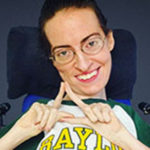Posted: 8/03/07
Faith changes little over a lifetime, research reveals
By Shona Crabtree
Religion News Service
WASHINGTON (RNS)—Michele Dillon and Paul Wink have interviewed scores of septuagenarians about their faith—or lack thereof—and compared their answers to those they gave during their teens and middle age.
What did they discover? People really don’t change much over time—religiosity in early adulthood is comparable to that in late adulthood, with a dip in middle age.
| Michele Dillon and Paul Wink interviewed scores of septuagenarians about their faith during an in-depth and long-term study. (RNS photo courtesy of Wellesley College) |
Other data include: religiosity peaks during teenage years; “spiritual seekers” (those who remain interested in religion while not being tied to one particular faith or tradition) and more church-oriented people are equally altruistic; and religion serves as a psychological buffer only for the elderly in poor health.
Dillon, professor of sociology at the University of New Hampshire, and Wink, professor of psychology at Wellesley College in Massachusetts, are the husband and wife co-authors of In the Course of a Lifetime: Tracing Religious Belief, Practice, and Change. The book uses statistical analysis and personal narratives to tell the story of religion in everyday lives.
The study is unusual, in part, because of the interdisciplinary collaboration of its authors but also because of its longevity, which enabled the authors to examine religion over time, and its breadth, with extensive interviews and detailed narratives.
Beginning in the 1920s, the University of California-Berkeley social science study interviewed more than 400 people, many of whom were subsequently interviewed about a range of topics, including religion, during their adolescence and again in the 1950s, ’70s, ’80s and ’90s.
The last round of interviews in the late 1990s included almost 200 people.
The data had not been mined in detail for its religious content, Dillon said. When she and Wink started going through the reams of research, they realized they had a treasure trove.
“I was really taken with this data, by the richness of their individual lives rather than just looking at the aggregate patterns,” she said.
The study lacked racial, geographic and religious diversity. It consisted primarily of white people in Northern California’s Bay Area who were predominantly Protestant and Catholic. But it was socio-economically diverse, Wink said.
Wink was surprised by the stability of religion in individuals over time.
“There are changes, but the changes are … more like a gentle ebb and flow rather than drastic changes,” he noted.
The findings challenge the dominant theory that older people become more religious when faced with death and health issues. The study also shed some light on middle age, which typically suffers from a paucity of psychological re-search, Wink said.
Previous studies examining people from their 50s to their 70s indicated a significant increase in religiosity. Taking a longer view showed that people actually return to levels of religiosity experienced in early adulthood.
Having school-age children tended to increase religious involvement, but it decreased, according to the study, when people reached their 40s and 50s and their children left home.
Religious participants fared better psychologically than nonreligious people, Wink and Dillon said. Precisely why being religious helps is difficult to determine, they said, but it may provide a sense of meaning in the face of adversity.
“I think religion does really give people what you might call a deeper sense of meaning, a deeper way or a frame by which to interpret some of the stuff that happens in life,” says Dillon.














We seek to connect God’s story and God’s people around the world. To learn more about God’s story, click here.
Send comments and feedback to Eric Black, our editor. For comments to be published, please specify “letter to the editor.” Maximum length for publication is 300 words.